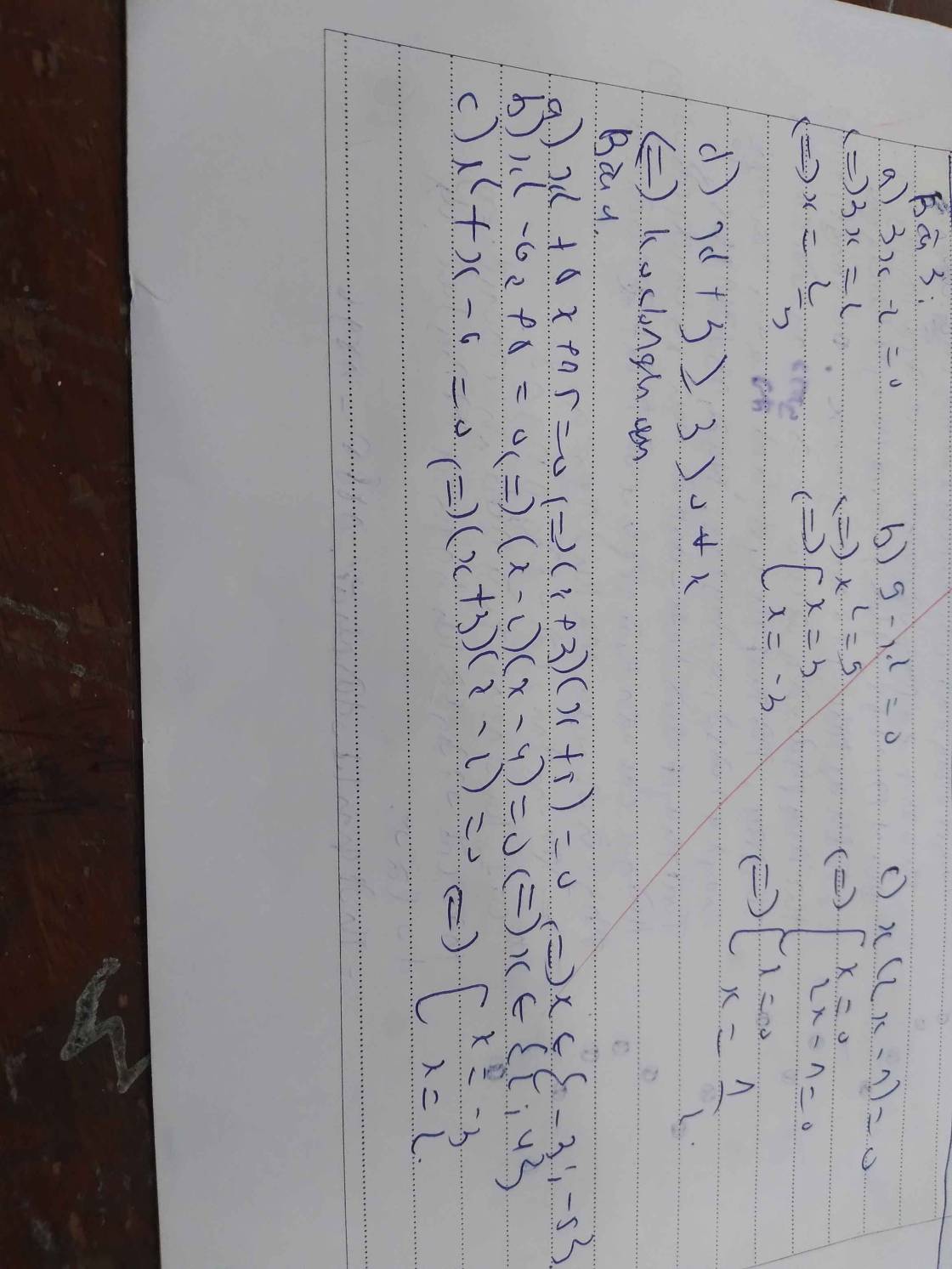

Hãy nhập câu hỏi của bạn vào đây, nếu là tài khoản VIP, bạn sẽ được ưu tiên trả lời.



a/\(3x-15=0\)
\(\Rightarrow3x=15\)
\(\Rightarrow x=5\)
Vậy nghiệm của A là x = 5
b/\(\left(x-2\right)\left(x+3\right)=0\)
\(\Rightarrow\left[{}\begin{matrix}x-2=0\\x+3=0\end{matrix}\right.\)
\(\Rightarrow\left[{}\begin{matrix}x=2\\x=-3\end{matrix}\right.\)
Vậy nghiệm của B là \(x\in\left\{2;-3\right\}\)
c/\(\left(2x-1\right)\left(x^2+2\right)=0\)
\(\Rightarrow\left[{}\begin{matrix}2x-1=0\\x^2+2=0\end{matrix}\right.\)
\(\Rightarrow\left[{}\begin{matrix}2x=1\\x^2=-2\left(loại\right)\end{matrix}\right.\)
\(\Rightarrow x=\dfrac{1}{2}\)
Vậy nghiệm của C là \(x=\dfrac{1}{2}\)
d/\(3x^2-6x=0\)
\(\Rightarrow x\left(3x-6\right)=0\)
\(\Rightarrow\left[{}\begin{matrix}x=0\\3x-6=0\end{matrix}\right.\)
\(\Rightarrow\left[{}\begin{matrix}x=0\\3x=6\end{matrix}\right.\)
\(\Rightarrow\left[{}\begin{matrix}x=0\\x=2\end{matrix}\right.\)
Vậy nghiệm của D là \(x\in\left\{0;2\right\}\)
e/\(2x\left(x-3\right)-5\left(x-3\right)=0\)
\(\Leftrightarrow\left(2x-5\right)\left(x-3\right)=0\)
\(\Rightarrow\left[{}\begin{matrix}2x-5=0\\x-3=0\end{matrix}\right.\)
\(\Rightarrow\left[{}\begin{matrix}2x=5\\x=3\end{matrix}\right.\)
\(\Rightarrow\left[{}\begin{matrix}x=\dfrac{5}{2}\\x=3\end{matrix}\right.\)
Vậy nghiệm của E là \(x\in\left\{\dfrac{5}{2};3\right\}\)

a) Sữa đề: \(x^2+2x-3=0\)
\(\Rightarrow x^2-x+3x-3=0\)
\(\Rightarrow x\left(x-1\right)+3\left(x-1\right)=0\)
\(\Rightarrow\left(x-1\right)\left(x+3\right)=0\)
\(\Rightarrow\left[{}\begin{matrix}x-1=0\\x+3=0\end{matrix}\right.\)
\(\Rightarrow\left[{}\begin{matrix}x=1\\x=-3\end{matrix}\right.\)
b) \(x^2-3x=0\)
\(\Rightarrow x\left(x-3\right)=0\)
\(\Rightarrow\left[{}\begin{matrix}x=0\\x-3=0\end{matrix}\right.\)
\(\Rightarrow\left[{}\begin{matrix}x=0\\x=3\end{matrix}\right.\)
c) \(2x-8x^3=0\)
\(\Rightarrow2x\left(1-4x^2\right)=0\)
\(\Rightarrow2x\left(1-2x\right)\left(1+2x\right)=0\)
\(\Rightarrow\left[{}\begin{matrix}2x=0\\1-2x=0\\1+2x=0\end{matrix}\right.\)
\(\Rightarrow\left[{}\begin{matrix}x=0\\x=\dfrac{1}{2}\\x=-\dfrac{1}{2}\end{matrix}\right.\)
d) \(\dfrac{2}{3}-6x^2=0\)
\(\Rightarrow\dfrac{2}{3}\left(1-9x^2\right)=0\)
\(\Rightarrow\dfrac{2}{3}\left(1-3x\right)\left(1+3x\right)=0\)
\(\Rightarrow\left[{}\begin{matrix}1-3x=0\\1+3x=0\end{matrix}\right.\)
\(\Rightarrow\left[{}\begin{matrix}x=\dfrac{1}{3}\\x=-\dfrac{1}{3}\end{matrix}\right.\)
a) Để tìm nghiệm của đa thức x^2 + 2x + 3, ta giải phương trình x^2 + 2x + 3 = 0. Áp dụng công thức nghiệm của phương trình bậc hai, ta có: x = (-2 ± √(2^2 - 4*1*3))/(2*1) x = (-2 ± √(4 - 12))/2 x = (-2 ± √(-8))/2 x = (-2 ± 2√2i)/2 x = -1 ± √2i Vậy đa thức x^2 + 2x + 3 không có nghiệm thực. b) Để tìm nghiệm của đa thức x^2 - 3x, ta giải phương trình x^2 - 3x = 0. Áp dụng công thức nghiệm của phương trình bậc hai, ta có: x = (3 ± √(3^2 - 4*1*0))/(2*1) x = (3 ± √(9))/2 x = (3 ± 3)/2 Vậy đa thức x^2 - 3x có hai nghiệm: x = 0 và x = 3. c) Để tìm nghiệm của đa thức 2x - 8x^3, ta giải phương trình 2x - 8x^3 = 0. Ta có thể rút gọn phương trình bằng cách chia cả hai vế cho 2, ta được: x - 4x^3 = 0 Vậy đa thức 2x - 8x^3 có một nghiệm duy nhất: x = 0. d) Để tìm nghiệm của đa thức 2/3 - 6x^2, ta giải phương trình 2/3 - 6x^2 = 0. Ta có thể đưa phương trình về dạng 6x^2 = 2/3 bằng cách nhân cả hai vế cho 3, ta được: 6x^2 = 2/3 Tiếp theo, ta chia cả hai vế cho 6, ta được: x^2 = 1/9 Áp dụng căn bậc hai cho cả hai vế, ta có: x = ± √(1/9) x = ± 1/3 Vậy đa thức 2/3 - 6x^2 có hai nghiệm: x = 1/3 và x = -1/3.

a) A(x) = 5x4 - 5 + 6x3 + x4 - 5x - 12
= (5x4 + x4) + (- 5 - 12) + 6x3 - 5x
= 6x4 - 17 + 6x3 - 5x
= 6x4 + 6x3 - 5x - 17
B(x) = 8x4 + 2x3 - 2x4 + 4x3 - 5x - 15 - 2x2
= (8x4 - 2x4) + (2x3 + 4x3) - 5x - 15 - 2x2
= 4x4 + 6x3 - 5x - 15 - 2x2
= 4x4 + 6x3 - 2x2 - 5x - 15
b) C(x) = A(x) - B(x)
= 6x4 + 6x3 - 5x - 17 - (4x4 + 6x3 - 2x2 - 5x - 15)
= 6x4 + 6x3 - 5x - 17 - 4x4 - 6x3 + 2x2 + 5x + 15
= ( 6x4 - 4x4) + ( 6x3 - 6x3) + (- 5x + 5x) + (-17 + 15) + 2x2
= 2x4 - 2 + 2x2
= 2x4 + 2x2 - 2

Bài 2:
a: A(x)=0
=>-4x+7=0
=>4x=7
=>x=7/4
b: B(x)=0
=>x(x+2)=0
=>x=0 hoặc x=-2
c: C(x)=0
=>1/2-căn x=0
=>căn x=1/2
=>x=1/4
d: D(x)=0
=>2x^2-5=0
=>x^2=5/2
=>\(x=\pm\dfrac{\sqrt{10}}{2}\)